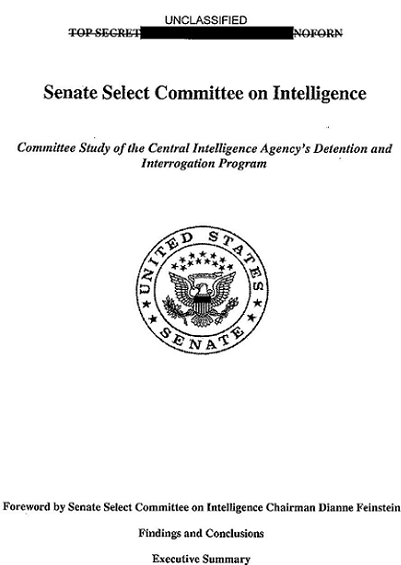No NSA Reform, No CIA Reform
Reflections on U.S. politics as an eternal talk show.
December 14, 2014

The Democrats serving on the U.S. Senate Intelligence Committee, led by Diane Feinstein of California, have released their summary report on CIA torture. What is ahead now that the report is out?
Expect a merry season of verbose handwringing, with endless protestations of (momentary) embarrassment and mellifluous promise of immediate betterment. Even emphatic claims of “Never Again!”
Just don’t believe it. All the statements by ever so embarrassed Senators, in the end, are but a highly ritualized form of appearing apologetic.
The news of the future will report that, despite the most earnest commitments to “fundamental change” of this “critically important” issue, nothing will happen. There will also be talk to hold an “in-depth national conversation,” including unrestrained readiness to “look deep into our national soul.” But that too is bound to be mostly lip service.
How do we know?
Remember the “major embarrassment” felt about the Snowden revelations that “required urgent changes in the law” in order to ensure that such “gross betrayals” of the rights of American citizens would never ever be repeated?
Or the statements that the NSA needed to be “reined in”? That it was an agency on autopilot? Well, there were high hopes for legislative reforms initially.
There were a spate of news articles and administration statements promising that real reform would come. Some people honestly thought that, given the immensity of the privacy violations by the NSA, this time things would be different.
In a parliamentary democracy, where majorities in the executive and legislative branches are by definition the same, reforms would likely have happened swiftly.
The national security establishment
Not so in the United States, with its traditionally gridlocked domestic politics. There, it is never easy to achieve reforms. Still, after Snowden’s revelations, many Democrats as well as some very right-wing Republicans, such as Rep. Sensenbrenner in the U.S. House, were adamant that things could not go on like that.
With such a wide-ranging coalition, along the entire U.S. political spectrum, what could possibly go wrong? A lot, as it turns out, led by a willy-nilly Obama Administration that always pretends to stand for principle before turning meek.
The Obama team is mere road kill for the U.S. version of the “deep state,” which here in the United States is charmingly called “the national security establishment.”
That establishment’s specialty is not so much torture and waterboarding – for those dirty jobs it has the hapless CIA. The deep state’s particular specialty – from official postings to TV pundit perches – is to bottle up any serious attempt to restrain its own near-unlimited range of maneuver.
At the same time, since the preservation of appearances matters a great deal in a PR-driven culture like the United States, the deep state – very much unlike its counterparts elsewhere — is well honed in paying solid-sounding lip service to reform.
In fact, its eagerness to pretend its readiness to undertake reforms is inversely related to letting reforms happen.
(For evidence, just consider how little movement has been seen on rolling back military equipping of police in the United States, despite months of highly embarrassing news reporting and street protests.)
And just in case there is a momentary element of civic courage in the U.S. debate – say, one-tenth of what became visible on the streets of Hong Kong recently – then the establishment just strikes back mercilessly.
Men like Dick Cheney, the former Vice President, or John E. McLaughlin, the former CIA Acting Director, and Max Boot at the New York-based Council on Foreign Relations, are very, very skilled in making the American people feel very afraid. That’s not too hard actually – Americans are quite easily scared.
Short attention spans
But America’s deep state has another surefire way of knowing that it will always win. The attention span of the country’s public at large, if it is even tuned into the issue at all, is very short.
Rest assured that by the time the next police killing or another high school shooting roll around, the current “hot” debate on the CIA’s torture practices will be wiped off the agenda. CNN, MSNBC and Fox will gladly switch to the new “crisis” as other “Breaking News.”
And so it was that by November 18, 2014, the much-touted “fundamental” reform of the NSA – the electronic version of the dirty laundry apparatus of the U.S. government – met, as was to be anticipated under the rituals of the American Republic, with its first-class state burial.
It came about as a mere “technical” matter, at the hands of a failed procedural vote to advance to a floor debate.
Never again — again and again
The very same, it stands to reason, will happen with the “CIA reform” that is now talked about. America tortured in the past – and it will torture again. Of course, it vowed “never again” after the Vietnam War, but the CIA was using it again within five years.
So here we are. In the end, all of this raises the question of the seriousness – even veracity – of the entire American enterprise. It used to be said that reform in America only happens when a real, monumental crisis has occurred.
It just ain’t so. Not only did real reform not follow on the Snowden revelations. It also did not happen following the U.S.- and Lehmann-triggered global financial crisis.
Fittingly, it was just this week, as the 113th U.S. Congress is wrapping up its business for good, that Wall Street banks scored another major victory in dulling the very few teeth that had been put in as part of the Dodd-Frank Act.
No, as things stand, indications are that America is not a serious country. Seriously. And that, not the so-called revelations that everybody pretty much knew about beforehand – is the real shame surrounding the CIA torture report.
Takeaways
Senators’ #TortureReport statements of “Never Again!” are a highly ritualized form of appearing apologetic.
In a real democracy, post crisis-reform would happen in no time. America is not a serious country.
It used to be said reform in America happens when a monumental crisis occurs. Not so.
After barely reacting to the 2008 crisis, the US will dull the very few teeth put into Dodd-Frank.

